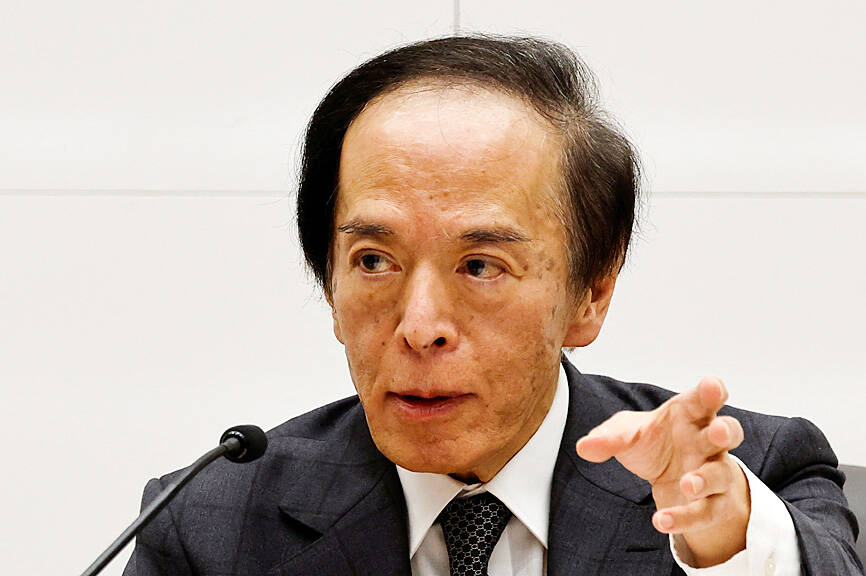Bank of Japan (BOJ) Governor Kazuo Ueda yesterday avoided giving a clear signal that he might raise interest rates next month, reiterating the need to keep monitoring risks for the economy, in comments that nudged down the yen.
“The timing and pace of adjusting the degree of monetary accommodation will depend on developments in economic activity and prices as well as financial conditions going forward,” Ueda said in a speech at a business conference in Tokyo.
“The bank needs to pay due attention to various risk factors at home and abroad, and to examine how these factors will affect the outlook and risks for Japan’s economic activity and prices, and the likelihood of realizing the outlook,” he said.

Photo: Reuters
The speech comes after Ueda indicated last week that the BOJ might wait longer before raising rates, a view that surprised investors expecting move next month if the bank did not act at its meeting this month. The policy stance of US president-elect Donald Trump was among the uncertain factors cited by Ueda at the time.
The governor yesterday continued in that vein. He appeared to want to keep his options open by noting the need to keep rates low to support the economy, while at the same time flagging the risk of maintaining rates at low levels for too long.
“Governor Ueda is keeping his hands free as there are lots of uncertainties including the yen and Trump,” Sompo Institute Plus Inc senior economist Masato Koike said.
“Today’s speech keeps open the chance of a January rate hike, but the likelihood of a March move is probably higher. It’s just too early to commit to a hike or no hike in January,” he said.
The yen weakened to as much as ¥157.37 against the US dollar following Ueda’s comments in Tokyo, from around ¥157.13 at the start of his speech. The move suggested a further recalibration toward a later rate hike among market participants.
As Japan transitions toward achieving stable 2 percent inflation, the BOJ would maintain easy financial conditions by keeping the rate lower than the neutral level to firmly support the economy, Ueda said.
“We have to make sure that Japan’s economy will not return to a deflationary or low-inflation environment,” he said.
The BOJ left its benchmark interest rate at 0.25 percent at this month’s policy meeting. In yesterday’s speech, Ueda said he has a lot to monitor by indicating he wants to see more data to gauge momentum in annual spring wage talks and the outlook for the US economy.
“With regard to Japan’s economy, a key issue in the short run is how the annual spring labor-management wage negotiations will develop,” Ueda said.
The BOJ hiked interest rates in March for the first time in 17 years. Some economists and policymakers feel the nation is ready for its next rate hike, as Japan’s inflation has stayed at or above BOJ’s target for two and a half years, and the economy has continued a moderate recovery.
Still, concern over Japanese Prime Minister Shigeru Ishiba’s minority government securing support for an annual budget might also be among the factors making policymakers at the central bank cautious about raising rates.
A small opposition party that Ishiba hopes would support the ruling party’s budget plans has yet to fully back the initial proposals.
It was Ueda’s last public speech this year. The BOJ board meets again to deliver its next policy decision on Jan. 24.

NEW IDENTITY: Known for its software, India has expanded into hardware, with its semiconductor industry growing from US$38bn in 2023 to US$45bn to US$50bn India on Saturday inaugurated its first semiconductor assembly and test facility, a milestone in the government’s push to reduce dependence on foreign chipmakers and stake a claim in a sector dominated by China. Indian Prime Minister Narendra Modi opened US firm Micron Technology Inc’s semiconductor assembly, test and packaging unit in his home state of Gujarat, hailing the “dawn of a new era” for India’s technology ambitions. “When young Indians look back in the future, they will see this decade as the turning point in our tech future,” Modi told the event, which was broadcast on his YouTube channel. The plant would convert

‘SEISMIC SHIFT’: The researcher forecast there would be about 1.1 billion mobile shipments this year, down from 1.26 billion the prior year and erasing years of gains The global smartphone market is expected to contract 12.9 percent this year due to the unprecedented memorychip shortage, marking “a crisis like no other,” researcher International Data Corp (IDC) said. The new forecast, a dramatic revision down from earlier estimates, gives the latest accounting of the ongoing memory crunch that is affecting every corner of the electronics industry. The demand for advanced memory to power artificial intelligence (AI) tasks has drained global supply until well into next year and jeopardizes the business model of many smartphone makers. IDC forecast about 1.1 billion mobile shipments this year, down from 1.26 billion the prior

People stand in a Pokemon store in Tokyo on Thursday. One of the world highest-grossing franchises is celebrated its 30th anniversary yesterday.

Zimbabwe’s ban on raw lithium exports is forcing Chinese miners to rethink their strategy, speeding up plans to process the metal locally instead of shipping it to China’s vast rechargeable battery industry. The country is Africa’s largest lithium producer and has one of the world’s largest reserves, according to the US Geological Survey (USGS). Zimbabwe already banned the export of lithium ore in 2022 and last year announced it would halt exports of lithium concentrates from January next year. However, on Wednesday it imposed the ban with immediate effect, leaving unclear what the lithium mining sector would do in the